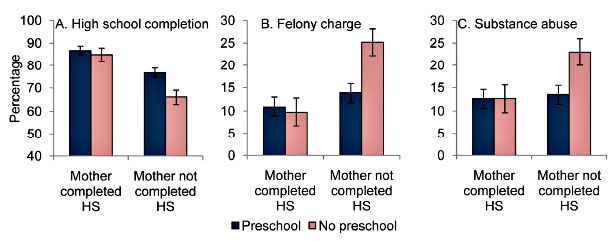A team of researchers has reported in Science on a long-term study of intensive preschool intervention in Chicago, and the results are pretty impressive. The study group is a cohort of mostly African-American children born in 1979-80, and the followup study was done when they were 28 years old. Here’s the headline set of charts:

The results were especially good among children born to mothers who never finished high school: high school completion rates were roughly ten percentage points higher and rates of substance abuse and felony charges were roughly ten percentage points lower. Overall, the preschool groups had higher high school graduation rates, higher on-time graduation rates, higher college attendance, higher economic status, and higher incomes compared to the group who didn’t attend preschool. Interestingly, the positive effects were limited to boys. Girls, however, responded more positively to school-age interventions.
So how much does this kind of preschool intervention cost? Let’s do some rough back-of-the-envelope figuring. The cost per student was about $10,000, and nationwide there are about 4 million kids each at ages 3 and 4. So if you implemented this for the entire country for two years of intervention, it would cost about $80 billion. More realistically, if you limited it to, say, the third of the population most at risk, it would cost something like $25 billion. And if you count just the amount over and above what we already spend on existing preschool programs, it’s more on the order of $15 billion.
Is that worth it? Well, out of 4 million kids, 2 million are boys and about 250,000 are children of mothers who didn’t complete high school. Within this group, about 30,000 more would complete high school and 30,000 fewer would commit serious crimes and become drug abusers. That’s per year. Fast forward 20 years from preschool and that adds up to about 300,000 kids between the ages of 16-25, the prime problem years. Just on the grounds of reduced crime and substance abuse within that group alone, this is money well spent. Add in all the other benefits, and doing something like this on a nationwide scale is a no-brainer.
And note that none of this is because this preschool program increased anyone’s IQ or SAT scores. It probably didn’t. But it did teach its students better cognitive habits, better impulse control, helped their motivation and social adjustment, and provided them with better family and school support behaviors. What’s more, this is no outlier or statistical fluke. This study joins a long list of others showing that habits are set in early childhood and intensive preschool programs are one of the most effective ways known to improve those habits for life.
None of this means we should stop trying to improve our schools. There are all sorts of reasons why better grade schools and high schools are important, and we should keep plugging away at figuring out how to make them more effective. But what it does mean is that in an environment of limited resources, our highest priority ought to be programs that we already know how to implement and that have proven bang for the buck. Intensive preschool fits that bill, and it’s simply moronic not to be directing big-time funding in that direction. Unlike the ed reform battles, it doesn’t provide endless fodder for the culture war bickering that we adults seem to love so much, but it sure seems to work pretty well for the kids themselves.















